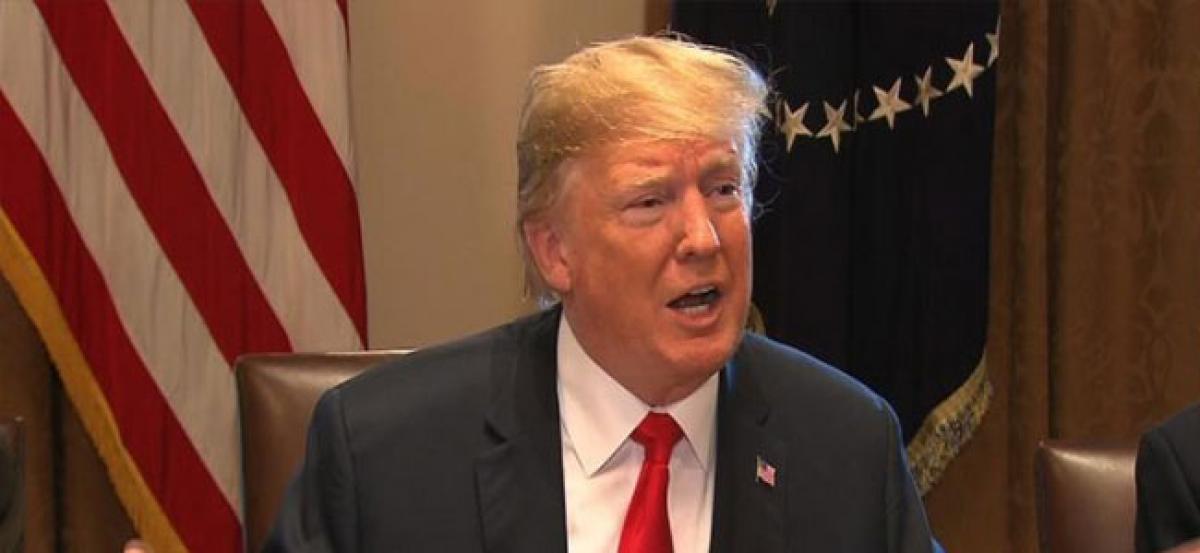Live
- SC dismisses rape survivor's plea seeking action against Kerala judge
- Chiranjeevi Engages with Russian Delegates on Creative Ventures in Hyderabad
- Has Allu Arjun's ‘Pushpa 2’ raked in Rs. 1000 Crore Pre-Release Business?
- Reports of spat with Netanyahu misleading: Germany
- 5.0-magnitude quake hits Alaska Peninsula
- AP assembly elections: Filing of nominations in full swing in the state
- Alaya F stuns in denim look, exudes boss babe energy
- Brillare Clinic Celebrates First Anniversary with Gratitude and Glamour
- Tillu Square: Sidhu Jonnalagadda’s Film to Stream on Netflix in 5 Languages
- Sharwanand’s ‘Maname’ teaser: A glimpse into a refreshing tale
Just In
Strong Geopolitical Basis. Time for India to differentiate relations with US administration and United States


After the advent of US President Donald Trump the global order has developed fissures in the recent years, which have been deepened and widened.
After the advent of US President Donald Trump the global order has developed fissures in the recent years, which have been deepened and widened. The Russia-West Cold War has been intensifying since 2014. It is characterised by Western sanctions against Russia, an information war of mutual recriminations and proxy wars in Ukraine, Syria and Afghanistan. Under the Trump administration, however, things have taken an even nastier curve. Military confrontation has been sharpened on all three fronts.
Sanctions have been given a new twist by extra-territorial application for targeting foreign companies engaging with Russia in the defence and energy sectors. Western efforts to “punish” Russia have resulted in a stronger Russia-China strategic partnership. In exchange for Chinese political and economic support, Russia has shared sophisticated military technologies with China and allowed the latter to enter into strategically important hydrocarbons projects.
The US unilaterally withdrew from the multilateral Iran nuclear deal and will now be imposing sanctions on foreign companies with projects/investments in that country. It has also introduced hefty import tariffs on steel and aluminium. The President’s candid tweets criticising these policies of the world leaders had caused an annoying effect on them.
The US imposition of tariffs on Chinese imports, to address the massive trade deficit and to punish China for violating intellectual property rights, has led to Chinese retaliation and US threats of counter-retaliation, creating fears of a wider trade war. President Trump’s out-of-the-box initiative for a summit with North Korea’s Chairman Kim Jong-un has been welcomed warmly, but there are underlying anxieties about its implications. Russia and China are anxious to ensure that they remain involved in the future dispensation in the Korean peninsula, which is in their backyard.
India has been under pressure from the US on tariffs, intellectual property rights and, above all, defence cooperation with Russia. It is being asked to halt negotiations for S-400 air defence systems and to reduce the proportion of its arms acquisitions from Russia. Political analysts have been struggling to decipher, from the bewildering jumble of US pronouncements and actions, a coherent “Trump Doctrine”. The US periodical The Atlantic recently explored the Trump administration’s worldview, through interviews with senior US officials.
One description of it was “no friends, no enemies”, which one can see in actions being taken without regard to relations with the concerned countries, when they are deemed to be in America’s interests. Another description was “permanent destabilisation creates American advantage” The third description, given by President Trump’s closest advisers, was, simply, “We’re America, bitch” — an earthy, aggressive (and, perhaps deliberately, misogynistic) encapsulation of Mr Trump’s view that America, as the world’s most powerful country, can assert itself everywhere without fear of consequences.
China, which has tended to see Russia as a junior partner, is now seeing greater worth regarding value in the partnership in the context of US unpredictability. Japan, a staunch US ally, is cultivating a stronger partnership with Russia and building bridges with strategic adversary China, which has found it equally expedient to reciprocate.
The future world order will be shaped by the interaction of these perspectives and actions. Under these circumstances, India’s options are conceptually simple, but diplomatically challenging. We have to persuade the United States that our strategic partnership is mutually beneficial, without linking it to India-Russia relations. Our diversification of defence acquisitions should ensure continued increase of imports from the US, specially if they are willing to transfer more sophisticated weapons and technologies.
There is a strong geopolitical basis for the strategic partnership with Russia and we should sustain its vibrancy. China’s concerns with global developments should enable India to maintain serenity in relations, pursuing mutually beneficial cooperation while remaining vigilant on threats to our strategic interests. Finally, it is important for us to differentiate relations with the US administration from relations with the United States.

© 2024 Hyderabad Media House Limited/The Hans India. All rights reserved. Powered by hocalwire.com






